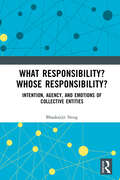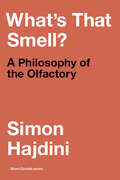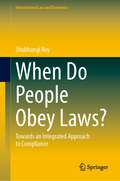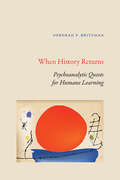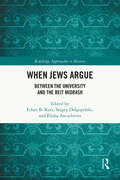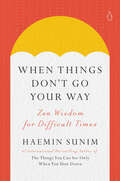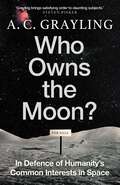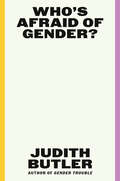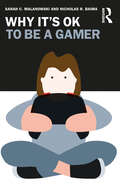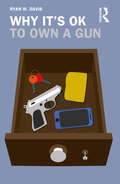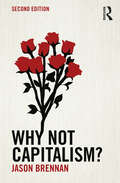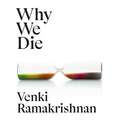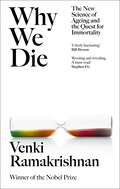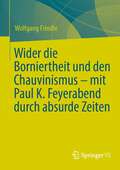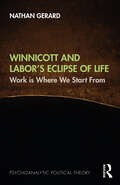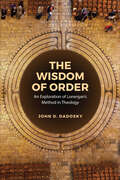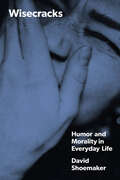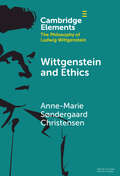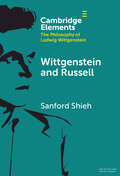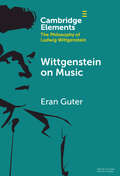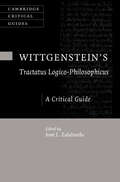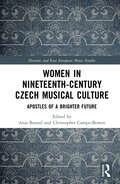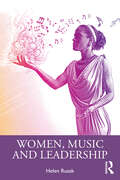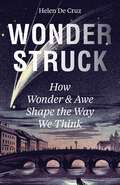- Table View
- List View
What Responsibility? Whose Responsibility?: Intention, Agency, and Emotions of Collective Entities
by Bhaskarjit NeogThis book is an enquiry into the meaning and nature of collective responsibility. It analyses the moral culpability of collective entities implicated in some of the most pressing contemporary ethical issues, including institutional injustice, corporate scams, organized crimes, gang wars, genocide, xenophobia, and other group-based violence. It asks: Who is responsible when a collective is (held) responsible? Is collective responsibility merely a façon de parler, a rhetorical way of talking about individual moral responsibility, or is it more than that? Using some of the latest resources from the philosophy of action, philosophy of mind, and social ontology, the author develops a nuanced non-individualist position with the help of a concept of collective agency. He interprets collective responsibility as the responsibility of a collective without either reducing it to the responsibility of the individual members or making it a case where their moral positions become blurred. An important intervention in moral philosophy, this book will be useful for scholars and researchers of moral philosophy, philosophy of action and mind, philosophy of social sciences, and political philosophy. It will also be a theoretical resource for legal theorists, just war theorists, game theorists, business ethicists, and policy makers.
What's That Smell?: A Philosophy of the Olfactory (Short Circuits)
by Simon HajdiniHow our sense of smell engages with philosophy, psychoanalysis, and political economy—and how it can help enrich our understanding of the nature of truth, language, economy, and sexuality.Why is it that, in Indo-European languages at least, we have no language to describe smells, leaving us (and famously Juliet) no choice but to call the scent of a rose simply &“sweet&”? In What's That Smell?, a groundbreaking exploration of the intersection between philosophy, psychoanalysis, and the oft-neglected sense of smell, Simon Hajdini sets out to answer this complex question. Through new readings of traditional and modern philosophical texts, Hajdini places smell at the very center of a philosophical critique of the traditional notion of truth, challenging the idea that smell is the antiphilosophical sense par excellence.Through fresh engagements with fundamental philosophical issues, original analyses of modern literature and film, and the novel use of scientific research into smell within a humanities context, Hajdini situates problems of olfaction at the very point of inception of cultural life. He proposes that ontology, civilization, and capitalist economy alike can be said to amount to "shit management." And only by following the philosophically most deplorable of the senses, the book argues, can we better understand the central philosophical, psychoanalytical, and political issues of truth, sex, and exploitation.
When Do People Obey Laws?: Towards an Integrated Approach to Compliance (International Law and Economics)
by Shubhangi RoyThis book examines the intricate dynamics of when individuals adhere to laws, taking into account the context in which laws attempt to shape human behavior. While existing literature touches upon various reasons why people comply with laws, the book focuses on a critical question which has been missing from the discussion: when do people obey laws? By treating law as a form of social communication, it develops an integrated framework to answer this question. It explores how social, psychological, and institutional conditions shape compliance decisions of individuals. What does a law signify? When does the compulsion to obey arise? When do individuals comply out of a fear for legal sanctions or social repercussions? Why do some laws have high symbolic values and others fail despite harsh punishments? The book unveils the contextual intricacies that underlie obedience to law. It challenges conventional wisdom and offers a fresh perspective on the power and limitationsof law in shaping human behavior. For scholars and academics seeking a deeper understanding of legal compliance and role of law in shaping behaviors, this book will be an indispensable resource.
When History Returns: Psychoanalytic Quests for Humane Learning (SUNY series, Transforming Subjects: Psychoanalysis, Culture, and Studies in Education)
by Deborah P. BritzmanWhen History Returns brings together psychoanalytic theories of learning with the antinomies of social strife. From a psychoanalytic perspective, history returns through transitional scenes of inheriting a past one could not make, experiencing a present affected by what came before, and facing a future one can neither know nor predict. Taking such scenes as the subject of education, Deborah P. Britzman provides new approaches and vocabulary for conceptualizing experience and understanding, as expressed in psychoanalysis, literature, film, clinical case studies, and warm pedagogy. Britzman argues that novel quests for humane responsibility take hold in the fallout of understanding, in the feel of history, in imaginative dialogues and missed encounters, and in searches for friendship, belonging, and affiliation. Each chapter charts these quests in contemporary education, carrying readers into the heart of learning and the emotional situations that urge the transitions of difficult knowledge into care for thinking and the questions that follow.
When Jews Argue: Between the University and the Beit Midrash (Routledge Approaches to History)
by Ethan B. Katz Sergey Dolgopolski Elisha AncselovitsThis book re-thinks the relationship between the world of the traditional Jewish study hall (the Beit Midrash) and the academy: Can these two institutions overcome their vast differences? Should they attempt to do so? If not, what could two methods of study seen as diametrically opposed possibly learn from one another? How might they help each other reconceive their interrelationship, themselves, and the broader study of Jews and Judaism? This book begins with three distinct approaches to these challenges. The chapters then follow the approaches through an interdisciplinary series of pioneering case studies that reassess a range of topics including religion and pluralism in Jewish education; pain, sexual consent, and ethics in the Talmud; the place of reason and devotion among Jewish thinkers as diverse as Moses Mendelssohn, Jacob Taubes, Sarah Schenirer, Ibn Chiquitilla, Yair Ḥayim Bacharach, and the Rav Shagar; and Jewish law as a response to the post-Holocaust landscape. The authors are scholars of rabbinics, history, linguistics, philosophy, law, and education, many of whom also have traditional religious training or ordination. The result is a book designed for learned scholars, non-specialists, and students of varying backgrounds, and one that is sure to spark debate in the university, the Beit Midrash, and far beyond.
When Things Don't Go Your Way: Zen Wisdom for Difficult Times
by Haemin SunimFrom renowned Zen Buddhist teacher Haemin Sunim, a guide to turning life's challenges into opportunities for self-discoveryHave you ever felt like life has thrown you a curveball? Are you struggling to overcome unexpected challenges and setbacks?While loss, heartbreak, and loneliness are all part of the human experience, in this warm guide, internationally bestselling author Haemin Sunim shows us that these moments can actually be rare opportunities for self-discovery, serving as stepping stones to greater things in life.Drawing on Zen Buddhist philosophy and Sunim&’s own experiences, When Things Don't Go Your Way helps you navigate life's challenges with resilience and grace. Whether you're dealing with rejection, uncertainty, loneliness, conflicts in relationships, or burnout--or simply seeking to improve your mental and emotional well-being--Sunim offers a new spiritual perspective, one that helps us face life's challenges with greater ease and understanding, and offers solace and courage when we need it the most.
Who Owns the Moon?: In Defence of Humanity's Common Interests in Space
by A. C. GraylingSilicon for microchips; manganese for batteries; titanium for missiles. The moon contains a wealth of natural resources. So, as the Earth&’s supplies have begun to dwindle, it is no surprise that the world&’s superpowers and wealthiest corporations have turned their eyes to the stars. As this new Space Race begins, A.C. Grayling asks: who, if anyone, owns the moon? Or Mars? Or other bodies in near space? And what do those superpowers and corporations owe to Planet Earth and its inhabitants as a whole? From feudal common land, through the rules of the sea, to the vast, nationless expanse of Antarctica, Grayling explores the history of the places which no one, and therefore everyone, owns. Examining the many ways this so-called terra nullius has fallen victim to &‘the tragedy of the commons&’ – the tendency for communal resources to be exploited by a few individuals for personal gain at the expense of everyone else – Who Owns the Moon? puts forward a compelling argument for a bold new global consensus, one which recognises and defends the rights of everyone who lives on this planet.
Who's Afraid of Gender?
by Judith ButlerInflamed by the rhetoric of public figures, the "anti-gender ideology movement" has sought to nullify reproductive justice, undermine protections against sexual and gender violence, and strip trans and queer people of their right to pursue a life without fear of violence. Here, Judith Butler, the groundbreaking thinker whose iconic Gender Trouble redefined how we understand gender and sexuality, confronts the attacks on "gender" that have become central to right-wing movements today. Who's Afraid of Gender? examines how "gender" has become a phantasm for emerging authoritarian regimes, fascist formations, and trans-exclusionary feminists. In this vital, courageous book, Butler illuminates the concrete ways in which this phantasm of gender collects and displaces anxieties and fears of destruction, resulting in a movement that demonizes struggles for equality, fuels aggressive nationalism, and leaves millions of people vulnerable to subjugation. An essential intervention into one of the most fraught issues of our moment, Who's Afraid of Gender? is a bold call to refuse the alliance with authoritarian movements and to make a broad coalition with all those who fight against injustice. Imagining new possibilities for freedom and solidarity, Butler offers us a hopeful work of social and political analysis that is both timely and timeless—a book whose verve and rigor only they could deliver.
Why It's OK to Be a Gamer (Why It's OK)
by Sarah C. Malanowski Nicholas R. BaimaIf you enjoy video games as a pastime, you are certainly not alone—billions of people worldwide now play video games. However, you may still find yourself reluctant to tell others this fact about yourself. After all, we are routinely warned that video games have the potential to cause addiction and violence. And when we aren’t being warned of their outright harms, we are told we should be doing something better with our time, like going outside, socializing with others, or reading a book. Playing video games is thus often seen at best as a waste of time, and at worst a source of violent tragedy.Why It’s OK to Be a Gamer takes on the pervasive assumption that playing video games is a childish and time-wasting hobby, and a potentially addictive and dangerous one at that. It argues instead that there are many ways in which gaming can help us flourish, for example by: developing genuine friendships and other meaningful relationships with others, helping us cultivate a virtuous personal character, giving us a unique aesthetic experience, providing us with psychological benefits, and just plain helping us relax and enjoy ourselves. Video games are not just for those with no life; on the contrary, they can help contribute to a rich and meaningful life.Key Features Introduces the philosophy of video games in a humorous and lively way with lots of engaging examples Defends gaming through a virtue theoretic approach Discusses contemporary psychology and neuroscience literature on gaming Includes discussion of gamers, video games, and common experiences of gaming
Why It's OK to Own a Gun (Why It's OK)
by Ryan W. DavisWhy It’s OK to Own a Gun explores the right to self-defense, but also looks beyond it to what gun ownership fundamentally means in American life. Guns can provide a source of meaning that doesn’t depend on how much money you have or how important your job is. Guns can offer a sense of shared identity that’s not hung up on intellectual credentials or ideological orthodoxy. For many responsible gun owners, owning a gun is a way of positively reclaiming one’s own agency in the world. It’s true that guns matter to only a minority of Americans, but the same could be said for many important political liberties. Like freedom of religion and freedom of expression, guns should be on the list of basic rights. In fact, they are: as some in America’s founding generation anticipated, gun rights have offered a bulwark for republican freedom. Because there is nothing morally wrong with any of these values, owning a gun is OK. Key Features: Discusses the grounds of the political rights of gun ownership Connects the debate over guns with the sociology of gun ownership Describes genuinely worthwhile features of a way of life that’s unfamiliar to many readers Considers empirical and normative aspects of the gun debate Thinks about individual rights in the context of state power
Why Not Capitalism?
by Jason BrennanMost people believe capitalism is a compromise with selfish human nature. As Adam Smith put it, "It is not from the benevolence of the butcher, the brewer, or the baker, that we expect our dinner, but from their regard to their own interest." Capitalism works better than socialism, according to this thinking, only because we are not kind and generous enough to make socialism work. If we were saints, we would be socialists.In Why Not Capitalism?, Jason Brennan attacks this widely held belief, arguing that capitalism would remain the best system even if we were morally perfect. Even then, private property and free markets would be the best way to realize mutual cooperation, social justice, harmony, and prosperity. Socialists seek to capture the moral high ground by showing that ideal socialism is morally superior to realistic capitalism. But, Brennan responds, ideal capitalism is superior to ideal socialism, and so capitalism beats socialism at every level.Clearly, engagingly, and at times provocatively written, Why Not Capitalism? will cause readers of all political persuasions to re-evaluate where they stand vis-à-vis economic priorities and systems—as they exist now and as they might be improved in the future.In this expanded second edition, Brennan responds to his critics throughout the book and provides two new, final chapters. One argues against egalitarianism in a capitalist utopia because egalitarianism frequently misdiagnoses the problems (for example, the problem with poverty isn’t that poor people have less but that they don’t have enough). The other new chapter shows that we don’t need to be angels in an anarchic utopia, but merely decent people who are willing to adhere to four undemanding moral principles.
Why We Die: The New Science of Ageing and the Quest for Immortality
by Venki RamakrishnanA major exploration of the science of why and how we age and die - from a Nobel Prize-winning biologist and former president of the Royal Society.'Ramakrishnan's writing is so honest, lucid and engaging' - Siddhartha MukherjeeThe knowledge of death is so terrifying that we live most of our lives in denial of it. Our fear of death has underpinned our religions, inspired our cultures, and also driven our science. Today we are living through a revolution in biology. Giant strides are being made in our understanding of why we age and die, and why some species live longer than others. Immortality, once a faint hope, has never been more within our grasp.Here, Nobel Prize-winning biologist Venki Ramakrishnan offers a definitive look at why we die - and whether we can do anything about it. Covering the recent breakthroughs in scientific research, he examines the cutting edge of efforts to extend lifespan by altering our natural biology and how this raises profound questions. Although we might not like it, might death might serve a necessary biological purpose? And what are the social and ethical costs of attempting to live forever? As science advances, we have much to gain. But might we also have much to lose?Why We Die is a narrative of uncommon insight and beauty from one of our leading public intellectuals.(P) 2024 Hodder & Stoughton Limited
Why We Die: The New Science of Ageing and the Quest for Immortality
by Venki Ramakrishnan'Spectacular. It changed my perspective on the whole living world but most of all myself.' - CHRIS VAN TULLEKEN'Combines science, politics, memoir and medicine with ease, grace and lucidity. An incredible journey.' SIDDHARTHA MUKHERJEE'Utterly fascinating. Clear, enthralling and packed with insights.' - BILL BRYSON'A thrilling ride through the science of ageing and death. A must-read.' - STEPHEN FRY_________Would you want to live forever?Nobel Prize-winning molecular biologist Venki Ramakrishnan transforms our understanding of why we age and die - and whether there's anything we can do about it.We are living through a revolution in biology. Giant strides are being made in our understanding of why we age and die, and why some species live longer than others. Immortality, once a faint hope, has never been more within our grasp.Examining recent scientific breakthroughs, Ramakrishnan shows how cutting-edge efforts to extend lifespan by altering our natural biology raise profound questions. Although we might not like it, does death serve a necessary biological purpose? And how can we increase our chances of living long, healthy and fulfilled lives? As science advances, we have much to gain. But might we also have much to lose?
Wider die Borniertheit und den Chauvinismus – mit Paul K. Feyerabend durch absurde Zeiten
by Wolfgang FrindteAnlässlich seines 100. Geburtstages wird an Paul K. Feyerabend erinnert; es werden seine Ideen diskutiert und es wird gefragt, inwieweit diese geeignet sind, aktuelle Geschehnisse und Konflikte zu beurteilen.
Wild-Tier-Fotografie: Ökologische, postkoloniale und ästhetische Perspektiven (Cultural Animal Studies #15)
by Martin Bartelmus Maurice SaßTechnische Innovationen der Fotografie erlaubten Ende des 19. Jahrhunderts, Wildtiere nicht mehr nur als Kadaver und Beute oder in Studio und Gehege abzulichten, sondern ihnen in ihrem natürlichen Habitat nachzuspüren. Die frühe Wildtierfotografie bediente damit ein populäres Interesse an der als lokal, national oder kolonial geschätzten Fauna, lieferte wichtige Beiträge zur zoologischen Forschung und verstand sich häufig als Vorkämpfer des Naturschutzes. Ganz neu stellte sich damit aber auch die Frage, wie man Tiere richtig fotografiert: technisch, ästhetisch, ethisch. Der Band beantwortet diese Fragen in historischer Perspektive und erschließt damit das Forschungsfeld der Wildtierfotografie.
Winnicott and Labor’s Eclipse of Life: Work is Where We Start From (Psychoanalytic Political Theory)
by Nathan GerardNathan Gerard draws upon the pathbreaking insights of a pediatrician and psychoanalyst D. W. Winnicott to offer a new set of ideas in the novel domain of contemporary work life and its discontents. Locating Winnicott within a broad landscape of critical scholarship that dissects work’s perils, the book positions Winnicott as both a radical critic and creative advocate for building a different kind of work life—one that might make room for the presence of self. By shuffling the discourse on neoliberal subjectivity to reclaim what Winnicott calls “unit status” of the separate self, Gerard differentiates Winnicott from the relational tradition by advocating for Winnicott’s non-relational aspects. Through such analysis, the book reveals how work and home have become two sides of the same impoverished coin, each contributing to a legitimately “bad environment” that perpetuates self-absence and annihilates one’s unique sense of “feeling real” and alive. Winnicott and Labor’s Eclipse of Life will be of interest to readers of Winnicott and psychoanalysis, organization and management studies, and anyone hoping to deepen their engagement with the dynamics of contemporary work life.
The Wisdom of Order: An Exploration of Lonergan’s Method in Theology (Lonergan Studies)
by John DadoskyIn 1972, renowned Canadian philosopher and theologian Bernard Lonergan published Method in Theology. Now, following the fiftieth anniversary of his landmark work, The Wisdom of Order presents the next step in advancing the thought of this significant religious theorist. In addition to the previously compiled Collected Works of Bernard Lonergan, this book aims to provide an appreciation and exploration of Method in Theology. It analyses the first five chapters of the work with commentaries to help readers traverse Lonergan’s thought more effectively and deeply. John D. Dadosky presents compelling exposition and observations to assist readers. The book explores questions related to the philosophical status of beauty, which Lonergan does not address. In addition to Lonergan’s three stages of meaning, the book also seeks to develop a fourth stage that pertains to the turn to alterity emphasizing positive relations with other cultures and religions. As a result, The Wisdom of Order critically analyses an important groundbreaking work while also highlighting areas for further development.
Wisecracks: Humor and Morality in Everyday Life
by David ShoemakerA philosopher’s case for the importance of good—if ethically questionable—humor. A good sense of humor is key to the good life, but a joke taken too far can get anyone into trouble. Where to draw the line is not as simple as it may seem. After all, even the most innocent quips between friends rely on deception, sarcasm, and stereotypes and often run the risk of disrespect, meanness, and harm. How do we face this dilemma without taking ourselves too seriously? In Wisecracks, philosopher David Shoemaker examines this interplay between humor and morality and ultimately argues that even morally suspect humor is an essential part of ethical life. Shoemaker shows how improvised “wisecracks” between family and friends—unlike scripted stand-up, sketches, or serials—help us develop a critical human skill: the ability to carry on and find the funny in tragedy. In developing a new ethics of humor in defense of questionable gibes, Wisecracks offers a powerful case for humor as a healing presence in human life.
Wittgenstein and Ethics (Elements in the Philosophy of Ludwig Wittgenstein)
by null Anne-Marie Søndergaard ChristensenIn Ludwig Wittgenstein's writings, ethics takes a central place in his thinking. This element investigates his engagement with ethics in both early and later thinking. Starting from the remarks on ethics in the Tractatus Logico-Philosophicus and the framing of these remarks, it presents two influential approaches to Tractarian ethics, before it develops a coherent reading of ethics in the early thinking, focusing on ethical silence and the relationship notions of world and the philosophical 'I'. The reading of 'A Lecture on Ethics' focuses on the critique of ethical theory and the personal dimension of ethics, two themes also running through Wittgenstein's later thinking. It considers Wittgenstein's later ethical investigations, of ethical examples, ethically relevant language uses of language and the connections between reflections on ethics and living. It also considers the role of the other in Wittgenstein's later thinking.
Wittgenstein and Russell: The Vicissitudes Of Judgment And Proposition (Elements in the Philosophy of Ludwig Wittgenstein)
by null Sanford ShiehThis Element provides clear and concise explanations of the most important of these responses: Wittgenstein's criticisms of Russell's theories of judgment in the summer of 1913. These criticisms show that Russell's theories do not provide a coherent account of the truth and falsity of judgments without a satisfactory theory of propositions. They are of first-rate importance for Wittgenstein's early philosophical development, setting the path to the conceptions of proposition and of logic in Tractatus Logico-Philosophicus. This Element details the steps of this philosophical development, in Wittgenstein's “Notes on Logic” and his wartime notebooks, culminating in the recognition of primitive notions of possibility and necessity as central to propositional representation and the nature of logic. It also touches on further aspects of Wittgenstein's responses to Russell after the Tractatus, in writings of the middle and later periods of Wittgenstein's philosophy.
Wittgenstein on Music (Elements in the Philosophy of Ludwig Wittgenstein)
by null Eran GuterIn this Element, the author set out to answer a twofold question concerning the importance of music to Wittgenstein's philosophical progression and the otherness of this sort of philosophical importance vis-à-vis philosophy of music as practiced today in the analytic tradition. The author starts with the idea of making music together and with Wittgenstein's master simile of language-as-music. The author traces these themes as they play out in Wittgenstein early, middle, and later periods. The author argues that Wittgenstein's overarching reorientation of the concept of depth pertaining to music in the aftermath of his anthropological turn, and against the backdrop of the outlook of German Romanticism, culminates in his unique view of musical profundity as 'knowledge of people.' This sets Wittgenstein's view in sharp contrast with certain convictions and debates that typify current analytically inclined philosophy of music.
Wittgenstein's Tractatus Logico-Philosophicus: A Critical Guide (Cambridge Critical Guides)
by José L. ZalabardoPublished just over a century ago, Wittgenstein's Tractatus Logico-Philosophicus is the only book-length work to have been published during his lifetime and it continues to generate interest and scholarly debate. It is structured as a series of propositions on metaphysics, language, the nature of philosophy, and the distinction between what can be said and what can be shown. This volume brings together eleven new essays on the Tractatus covering a wide variety of topics, from the central Tractarian doctrines concerning representation, the structure of the world and the nature of logic, to less prominent issues including ethics, natural science, mathematics and the self. Individual essays advance specific exegetical debates in important ways, and taken as a whole they offer an excellent showcase of contemporary ideas on how to read the Tractatus and its relevance to contemporary thought.
Women in Nineteenth-Century Czech Musical Culture: Apostles of a Brighter Future (Slavonic and East European Music Studies)
by Anja Bunzel Christopher Campo-BowenThis volume focuses on the circumstances of women’s music-making in the vibrant and diverse environment of the Czech lands during the nineteenth century. It sheds light on little-known women musicians, while also considering more well-known works and composers from new woman-centric perspectives. It shows how the unique environment of Habsburg Central Europe, especially Bohemia and Lower Austria, intersects with gender to reveal hitherto unexplored networks that challenge the methodological nationalism of music studies as well as the discipline’s continued emphasis on singular canonical figures. The main areas of enquiry address aspects of performance and identity both within the Czech lands and abroad; women’s impact on social life with a view to different private, semiprivate, and public contexts and networks; and compositional aesthetics in musical works by and about women, analysed through the lens of piano works, song, choir music, and opera, always with the reception of these works in mind.
Women, Music and Leadership
by Helen RusakWomen, Music and Leadership offers a wide-ranging survey of women in musical leadership and their experiences, highlighting women’s achievements and considering how they negotiate the challenges of the leadership space in music. Women have always participated in music as performers, teachers, composers and professionals, but remain underrepresented in leadership positions. Covering women’s leadership across a wide variety of roles and musical genres, this book addresses women in classical music, gospel, blues, jazz, popular music, electronic music and non-Western musical contexts, and considers women working as composers, as conductors, and in music management and the music business. Each chapter includes several case studies of women’s careers, exploring their groundbreaking contributions to music and the challenges they faced as leaders. Connecting management theory and leadership research with feminist musicology, this book paints a new picture of women’s major contributions as leaders in music and their ongoing struggles for equity. It will be relevant to students and scholars in arts and music management, as well as all those studying music, gender or leadership, and women music professionals.
Wonderstruck: How Wonder and Awe Shape the Way We Think
by Helen De CruzA philosopher explores the transformative role of wonder and awe in an uncertain worldWonder and awe lie at the heart of life&’s most profound questions. Wonderstruck shows how these emotions respond to our fundamental need to make sense of ourselves and everything around us, and how they enable us to engage with the world as if we are experiencing it for the first time.Drawing on the latest psychological insights on emotions, Helen De Cruz argues that wonder and awe are emotional drives that motivate us to inquire and discover new things, and that humanity has deliberately nurtured these emotions in cultural domains such as religion, science, and magic. Tracing how wonder and awe unify philosophy, the humanities, and the sciences, De Cruz provides new perspectives on figures such as Plato, Aristotle, Adam Smith, William James, Rachel Carson, Maurice Merleau-Ponty, Jean-Paul Sartre, and Abraham Heschel. Along the way, she explains how these singular emotions empower us to be open-minded, to experience joy and hope, and to be resilient in the face of personal troubles and global challenges.Taking inspiration from Descartes&’s portrayal of wonder as &“that sudden surprise of the soul,&” this illuminating book reveals how wonder and awe are catalysts that can help us reclaim what makes life worth living and preserve the things we find wonderful and valuable in our lives.
